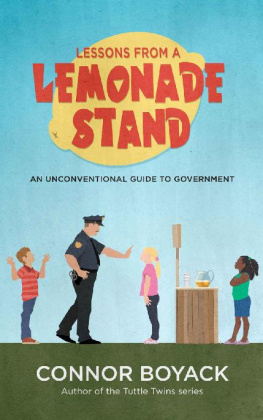To all those in my life who helped me find the red pill.
FOREWORD
by Tom Woods
W e are told that what makes our system great is that we make political decisions through rational discussion, not the arbitrary fiat of the kings of yore. But in fact, the last thing the state wants is calm deliberation. It thrives on fear. Government power tends to expand no matter what, to be sure, but it expands much more rapidly under what are perceived as emergency conditions. Give us more power, citizen! Theres no time to lose!
Government officials push this line because they know that power once granted is almost never relinquished. All they need to do is trick the public into accepting the latest rationale for additional rounds of government expansion. The people may later repent of their haste in consenting to this episode of government growth, but these second thoughts rarely amount to full-fledged campaigns of repeal, especially since theyd be up against the power and institutional inertia of entrenched bureaucracy, which rarely yields ground.
The exploitation of the public through fear is not limited to left or right. It is common to both sides of what we laughingly call our political spectrum. The left spins tales of wicked businessmen, who without the benevolent hand of government would lord it over the rest of us, and who would churn out poison sandwiches and exploding computer monitors. The right warns us of foreign malefactors who have no rational motivations or identifiable grievances. They wish only to pursue evil, we are told, and they attack the United States not because of anything the U.S. government has done, but simply out of envy at the sheer awesomeness of the American people. (The establishment left gets in on this act, too, having in fact supported every major American war since World War I.)
When it comes to war, our political class has given us no reason not to be skeptical of its breathless claims. Few major American wars have not relied for their popular appeal on some deliberately cultivated falsehood. A few recent examples might include the alleged Gulf of Tonkin incident (Vietnam), babies being tossed out of incubators (Iraq I), genocide (Kosovo, where hundreds of thousands of dead turned out to be 2000 dead on both sides of a civil war combined), weapons of mass destruction (Iraq II), and many others besides. Tony Blair warned that Saddam Husseins unmanned drones could reach the United Kingdom within 45 minutes. Saddams entire drone program turned out to be a single prototype of plywood and string. But the story served its purpose: why, weve got to get Saddam, a two-bit nobody that no Westerner in his right mind had been concerned about just ten minutes earlier.
The two sides came together in the Panic of 2008 to push through all manner of ill-conceived bailouts, which we know in retrospectas if we didnt know it at the timemade no sense. For example, normal bankruptcy proceedings for AIG would not have destroyed the economy or sent Main Street banks reeling, as we were solemnly assured it would. Main Street banks had zero exposure to the credit-default swap problem facing AIG. Had anyone bothered to check, they would have found that a grand total of about a dozen financial institutions around the world would have taken a hit. The combined capitalization of those dozen firms was $20 trillion. The loss they would have taken was in the neighborhood of $60 billiona few months worth of bonuses, in other words.
No wonder the political class insisted there was no time for us to look closely at these deals.
Now this episode was a little different: it was not a case of using the publics fear to stampede the people into granting still more power to the federal government. The public was in fact overwhelmingly opposed to the bailouts, a sentiment to which the flood of angry phone calls to congressional offices provided ample testimony. Instead, the political establishment chided the public for not being appropriately fearful, and went on to carry out government policy based on fear they insisted the people should have had. Yes, yes, were sorry we have to do this, the official line ran, and were sorry we have to do it so quickly and without deliberation, and were sorry we have to ignore your opinions, but trust us: this is really scary, and although wed prefer not to put it this way, you stupid rubes are too simple to understand the terrible danger involved.
In general, government cultivates fear among the public, and in turn exploits that fear on behalf of increases in its own power. Connor Boyack examines this process in a sophisticated and compelling way in this valuable book. But he does more than simply identify the problem. He explains how to thwart governments use of fear, and how we can keep our heads as government tries to send us into a panic. If these lessons are absorbed, the next time government sets out to expand its power in light of some crisis, it wont be able to play Americans like a fiddle.
INTRODUCTION
Timid men prefer the calm of despotism to
the tempestuous sea of liberty.
Thomas Jefferson
A t the brink of war with France, the U.S. Congress passed a collection of laws referred to as the Alien and Sedition Acts. Described by their Federalist proponents as war measures, the Democrat-Republican opponents saw them as unconstitutional and indefensible. While each of the four laws was claimed to be a response to escalating tensions with France, they were mostly a political weapon to be used against members of the minority (Democrat-Republican) party.
One of the laws, the Naturalization Act, increased the time immigrants had to wait for citizenship and voting rights from 5 to 14 years. As immigrants tended to favor Thomas Jeffersons Democrat-Republican party (commonly referred to simply as Republicans), the Federalist intent of this law was to minimize the growth, and therefore the power, of the opposition. As one Federalist said in congressional debate, [I do] not wish to invite hordes of the turbulent and disorderly of all parts of the world, to come here with a view to disturb our tranquility, after having succeeded in the overthrow of their own governments.
Two of the four laws, the Alien Enemies Act and the Alien Friends Act, purportedly granted authority to the president to deport an alien who was either deemed dangerous or who was from a country at war with the United States. The worst of the four laws, the Sedition Act, criminalized speech by punishing any person who wrote or printed false, scandalous and malicious writing against Congress or the president that meant to defame or to bring them, or either of them, into contempt or disrepute; or to excite against them the hatred of the good people of the United States (Notably, the Sedition Act did not punish such speech against the vice president, Thomas Jefferson, who was not a Federalist.) President John Adams signed the Acts into law on June 14, nine years to the day after the French Revolution began.














